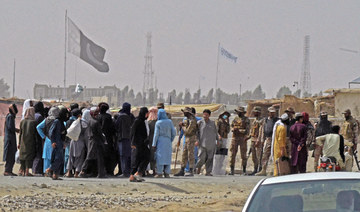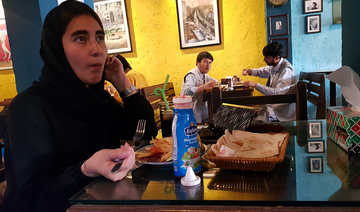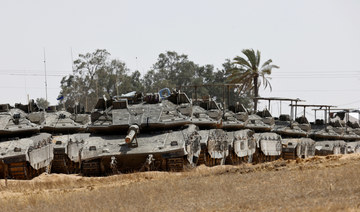WASHINGTON: The Biden administration said Wednesday that it is prepared to begin evacuation flights for Afghan interpreters and translators who aided the US military effort in the nearly 20-year war.
The Operation Allies Refuge flights out of Afghanistan during the last week of July will be available first for special immigrant visa applicants already in the process of applying for US residency, according to the White House.
White House press secretary Jen Psaki declined to detail how many Afghans are expected to be among those evacuated in the first flights or where those evacuated will be taken, citing security concerns.
“The reason that we are taking these steps is because these are courageous individuals,” Psaki said. “We want to make sure we recognize and value the role they’ve played over the last several years.”
President Joe Biden has faced pressure from lawmakers on both sides of the aisle to come up with a plan to help evacuate Afghan military helpers ahead of next month’s US military withdrawal. The White House began briefing lawmakers on the outlines of their plans last month.
The evacuation planning could potentially affect tens of thousands of Afghans. Several thousand Afghans who worked for the US — plus their family members — are already in the application pipeline for special immigrant visas.
The Biden administration has also been working on identifying a third country or US territory that could host Afghans while their visa applications are processed.
Krish O’Mara Vignarajah, president and CEO of Lutheran Immigration and Refugee Service, said that much about the Biden evacuation plan remains unknown, including how the administration will help those in areas outside the capital of Kabul evacuate. The Taliban has made rapid gains in taking over huge swaths of the country, particularly in more rural areas.
“Unfortunately, there are still far too many questions left unanswered, including who exactly and how many people are eligible for evacuation. ... How will those outside the capital access safety?” said Vignarajah, whose group has helped resettle thousands of Afghans in the US “And to what countries will they be evacuated? We have serious concerns about the protection of our allies’ human rights in countries that have been rumored as potential partners in this effort.”
The administration is weighing using State Department-chartered commercial aircraft, not military aircraft, according to an administration official, who spoke on condition of anonymity to discuss internal deliberations. But if the State Department requests military aircraft, the US military would be ready to assist, the official said.
Tracey Jacobson, a three-time chief of mission in Tajikistan, Turkmenistan and Kosovo, is leading the State Department coordination unit that will deliver on the president’s commitment under Operation Allies Refuge. That unit also includes representatives from the defense and homeland security departments.
Russ Travers, deputy homeland security adviser and former head of the National Counterterrorism Center, is coordinating the interagency policy process on Operation Allies Refuge, officials said.
Separately, the White House announced that Elizabeth Sherwood-Randall, the White House homeland security adviser, would lead a US delegation to a security conference in Uzbekistan this week to discuss Afghanistan’s security issues with leaders from the Central 5 — Austria, the Czech Republic, Hungary, Slovakia and Slovenia — and other regional players.
Afghan President Ashraf Ghani and Zalmay Khalilzad, US special envoy on Afghanistan reconciliation, are also expected to take part in the conference.
US officials have said that one possibility under discussion is to relocate the Afghan visa applicants to neighboring countries in Central Asia, where they could be protected from possible retaliation by the Taliban or other groups.
The White House and State Department have declined to comment on the exact numbers to be relocated or where they might go. The US Embassy in Kabul issued 299 special immigrant visas in March, 356 in April and 619 in May, according to the State Department. Biden said last week that the federal government has approved 2,500 special immigrant visas to come to the US since his January inauguration.
Biden announced last week that the US military operation in Afghanistan will end on Aug. 31.
The firming of the date to end the war comes after former President Donald Trump’s administration negotiated a deal with the Taliban to end the US military mission by May 1, 2021. Biden, after taking office, announced that US troops would be out by the 20th anniversary of the Sept. 11, 2001, attacks. The attacks were plotted by Al-Qaeda leader Osama bin Laden from Afghanistan, where he had been given refuge by the Taliban.
Former President George W. Bush, who launched the war, criticized the Western withdrawal from Afghanistan in an interview with a German broadcaster released Wednesday, saying he fears for Afghan women and girls as the Taliban regains control of much of the country.
“It’s unbelievable how that society changed from the brutality of the Taliban, and all of a sudden — sadly — I’m afraid Afghan women and girls are going to suffer unspeakable harm,” Bush said.
US to begin evacuating Afghans who aided American military
https://arab.news/2jr4q
US to begin evacuating Afghans who aided American military
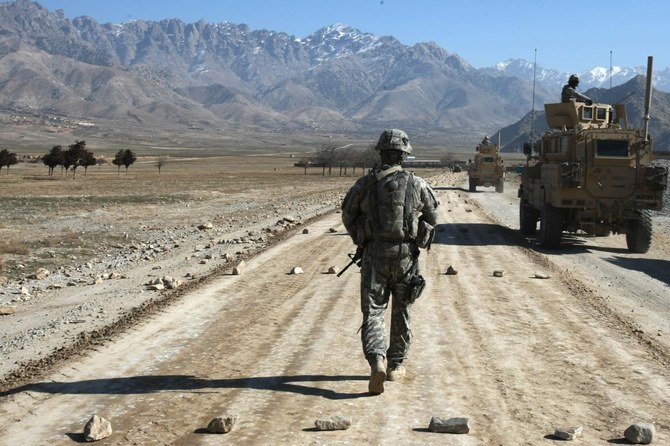
- Operation Allies Refuge flights out of Afghanistan during July’s last week will be available first for special immigrant visa applicants
- White House press secretary declined to detail how many Afghans are expected to be among those evacuated in the first flights
PM Modi votes as India’s marathon election heats up

- Modi’s ruling Bharatiya Janata Party is expected to win India’s election convincingly
- Indian PM has stepped up rhetoric on India’s main religious divide in bid to rally voters
AHMEDABAD, India: Hindu nationalist Prime Minister Narendra Modi cast his ballot Tuesday in India’s ongoing general election after giving several inflammatory campaign speeches accused of targeting minority Muslims.
Turnout so far has dropped significantly compared with the last national poll in 2019, with analysts blaming widespread expectations that Modi will easily win a third term and hotter-than-average temperatures heading into the summer.
Modi walked out of a polling booth early morning in the city of Ahmedabad while holding up a finger marked with indelible ink, flanked by security personnel and cheered by supporters.
“Voted in the 2024 Lok Sabha elections,” Modi said on social media platform X, referring to India’s lower house of parliament.
“Urging everyone to do so as well and strengthen our democracy.”
The premier’s ruling Bharatiya Janata Party (BJP) is expected to win the election convincingly, but since the vote began on April 19, Modi has stepped up his rhetoric on India’s main religious divide in a bid to rally voters.
He has used public speeches to refer to Muslims as “infiltrators” and “those who have more children,” prompting condemnation from opposition politicians, who have complained to election authorities.
Modi has also accused Congress, the main party in the disparate opposition alliance competing against him, of planning to reallocate the nation’s wealth to Muslim households.
“This is the first time in a long time that he is so direct,” said Hartosh Singh Bal, executive editor at news magazine The Caravan.
“I haven’t seen him be this directly bigoted, usually he alludes to bigotry,” he added.
“The comments on wealth redistribution are targeting something from the Congress manifesto that just does not exist and that is frankly quite unfortunate.”
Modi remains widely popular a decade after coming to power, in large part due to his government’s positioning the nation’s majority faith at the center of its politics, despite India’s officially secular constitution.
In January, the prime minister presided over the inauguration of a grand temple to the deity Ram, built on the site of a centuries-old mosque razed by Hindu zealots decades earlier.
Construction of the temple fulfilled a long-standing demand of Hindu activists and was widely celebrated across India, with extensive television coverage and street parties.
Modi’s brand of Hindu-nationalist politics has in turn made India’s 220-million-plus Muslim population increasingly anxious about their future in the country.
The election commission has not sanctioned Modi for his remarks despite its code of conduct prohibiting campaigning on “communal feelings” such as religion.
India’s election is conducted in seven phases over six weeks to ease the immense logistical burden of staging the democratic exercise in the world’s most populous country.
Much of southern Asia was hit by a heatwave last week that saw several constituencies vote in searing temperatures.
In the city of Mathura, not far from the Taj Mahal, temperatures crossed 41 degrees Celsius (106 degrees Fahrenheit) on polling day, and election commission figures showed turnout dropping nearly nine points to 52 percent from five years earlier.
An analysis of turnout data published by The Hindu newspaper concluded it was too early to determine whether hot weather was impacting voter participation.
But India’s weather bureau has forecast more heatwave spells to come in May and the election commission formed a taskforce last month to review the impact of heat and humidity before each round of voting.
High temperatures were forecast for several locations voting on Tuesday including the states of Madhya Pradesh and Bihar.
Years of scientific research have found climate change is causing heatwaves to become longer, more frequent and more intense.
More than 968 million people are eligible to vote in the Indian election, with the final round of polling on June 1 and results expected three days later.
Ground invasion of Rafah would be ‘intolerable,’ UN chief warns

- Israel has killed more than 34,700 Palestinians, around two-thirds of them children and women, according to Gaza health officials
UNITED NATIONS, United States: A ground invasion of Rafah would be “intolerable,” UN Secretary-General Antonio Guterres said Monday, calling on Israel and Hamas “to go an extra mile” to reach a ceasefire deal.
“This is an opportunity that cannot be missed, and a ground invasion in Rafah would be intolerable because of its devastating humanitarian consequences, and because of its destabilizing impact in the region,” Guterres said as he received Italian President Sergio Mattarella.
UK military personnel’s data accessed in hack, BBC reports

- MPs could be informed about the development in the Commons on Tuesday
Some personal information in a payroll system used by Britain’s defense department has been accessed in a data breach, the BBC reported on Monday.
The system was managed by an external contractor and no operational Ministry of Defense data was obtained, the broadcaster said, adding that the department took the system off-line immediately.
Information like names and bank details of current and some former members of the Royal Navy, Army and Air Force was compromised, according to the report.
The Ministry of Defense did not immediately respond to a Reuters’ request for comment outside working hours.
MPs could be informed about the development in the Commons on Tuesday, the report added.
Russia says it takes control of two more settlements in eastern Ukraine
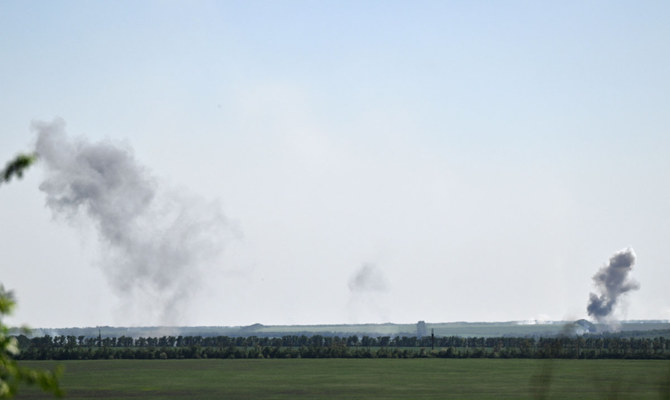
- Russia has made slow but steady advances since taking Avdiivka in February, with a string of villages in the area falling to Moscow’s forces
MOSCOW: Russian forces have taken control of the settlements of Soloviove in Ukraine’s eastern Donetsk region and Kotliarivka further north in the Kharkiv region, the defense ministry said on Monday.
Ukraine’s military made no mention of either locality in its evening General Staff report. Kharkiv Regional Governor Oleh Syniehubov said on Monday that Kotliarivka, located near the town of Kupiansk, was one of several locations to come under Russian shelling.
But Ukrainian bloggers appeared to acknowledge that both villages were in Russian hands.
DeepState, a popular forum on the war, noted on Saturday that Kotliarivka had been captured by Russian forces and on Sunday said the neighboring village of Kyslivka was also in Russian hands.
DeepState reported that Soloviove, northwest of the Russian-held town of Avdiivka, had been taken by Russian forces last week.
Russia has made slow but steady advances since taking Avdiivka in February, with a string of villages in the area falling to Moscow’s forces.
UNICEF warns 600,000 children face ‘catastrophe’ in Rafah
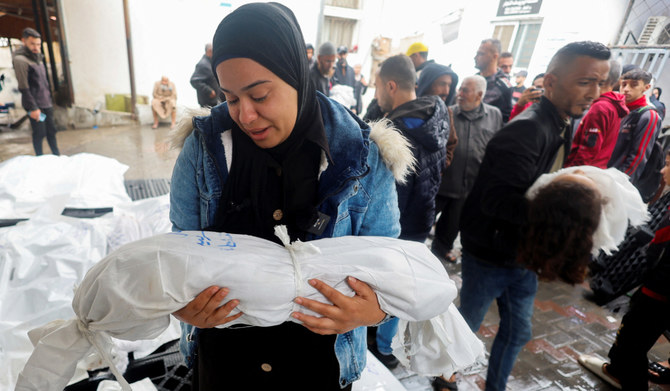
- Calling again for a ceasefire and safe access for humanitarian organizations, the agency highlighted there are some 78,000 infants under age two sheltering in the city, along with 175,000 children under five who are affected by infectious disease
- Israel has killed more than 34,000 Palestinians in Gaza, mostly women and children, according to the health ministry in the Hamas-run territory
NEW YORK: Some 600,000 children packed into Gaza’s Rafah city face “further catastrophe,” UNICEF warned on Monday, urging against their forced relocation after Israel ordered an evacuation ahead of its long-threatened ground invasion.
“Given the high concentration of children in Rafah ... UNICEF is warning of a further catastrophe for children, with military operations resulting in very high civilian casualties and the few remaining basic services and infrastructure they need to survive being totally destroyed,” the UN children’s agency said in a statement.
It said Gaza’s youth were already “on the edge of survival,” with many in Rafah — where the agency said the population has soared to 1.2 million people, half of them children — already displaced multiple times and with nowhere else to go.
“More than 200 days of war have taken an unimaginable toll on the lives of children,” said UNICEF Executive Director Catherine Russell.
“Rafah is now a city of children, who have nowhere safe to go in Gaza,” she said, warning that a large-scale military operation by Israel would bring “chaos and panic, and at a time where (children’s) physical and mental states are already weakened.”
UNICEF estimates that Rafah’s population has swelled to nearly five times its normal figure of 250,000 residents.
Calling again for a ceasefire and safe access for humanitarian organizations, the agency highlighted there are some 78,000 infants under age two sheltering in the city, along with 175,000 children under five who are affected by infectious disease.
Gaza’s bloodiest-ever war began following Hamas’s unprecedented Oct. 7 attack on Israel.
Israel has conducted a retaliatory offensive that has killed at least 34,735 people in Gaza, according to the Hamas-run
territory’s Health Ministry.
Of that toll, more than 14,000 are children, the ministry has said.
Israeli Prime Minister Benjamin Netanyahu has vowed to send ground troops into Rafah regardless of any truce, despite concerns from the US, other countries, and aid groups.
Hamas official Izzat Al-Rashiq said in a statement that any Israeli operation in Rafah would put the truce talks in jeopardy.
Senior Hamas official Sami Abu Zuhri said the evacuation order was a “dangerous escalation” that would have consequences.
“The US administration, alongside the occupation, bears responsibility for this terrorism,” the official said.
Hamas said later in a statement that any offensive in Rafah would not be a “picnic” for Israeli forces and said it was fully prepared to defend Palestinians there.
Aid agencies have warned that the evacuation order will lead to an even worse humanitarian disaster in the crowded coastal enclave of 2.3 million people reeling from seven months of war.
“Forcing 1 million displaced Palestinians from Rafah to evacuate without a safe destination is not only unlawful but would lead to catastrophic consequences,” British charity ActionAid said.
Nick Maynard, a British surgeon trying to leave Gaza on Monday, said in a voice message from the Gaza side of the Rafah crossing into Egypt: “Two huge bombs have just gone off immediately outside the crossing. There’s a lot of gunfire as well about 100 meters from us. We are very unclear whether we will get out.”
“Driving through Rafah, the tension was palpable with people evacuating as rapidly as they could.”
Witnesses said the areas in and around Rafah where Israel wants to move people are already crowded with little room for more tents.
“The biggest genocide, the biggest catastrophe, will take place in Rafah. I call on the whole Arab world to interfere for a ceasefire — let them interfere and save us from what we are in,” said Aminah Adwan, a displaced Palestinian.
Israel has been threatening to launch incursions in Rafah, which it says harbors thousands of Hamas fighters and potentially dozens of hostages.
Victory is impossible without taking Rafah, it says.



